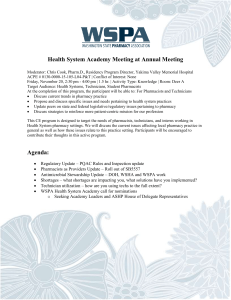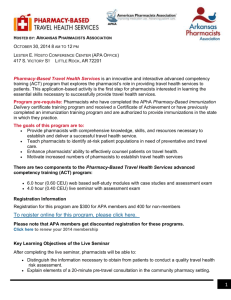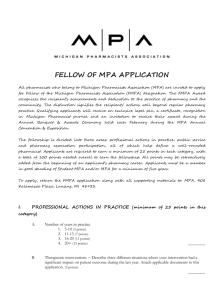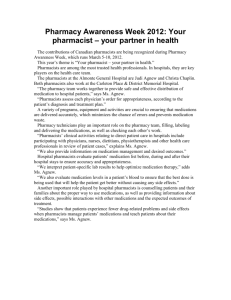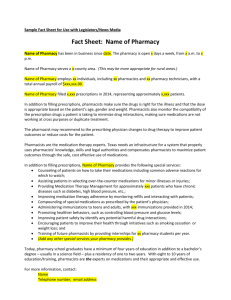Word Version
advertisement
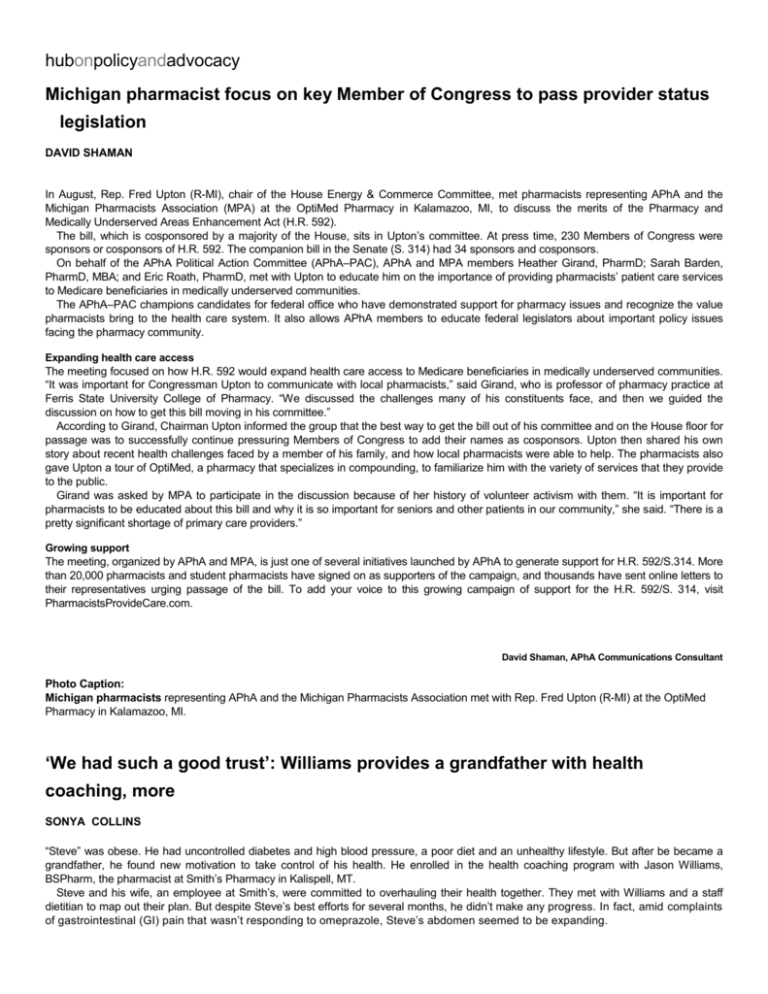
hubonpolicyandadvocacy Michigan pharmacist focus on key Member of Congress to pass provider status legislation DAVID SHAMAN In August, Rep. Fred Upton (R-MI), chair of the House Energy & Commerce Committee, met pharmacists representing APhA and the Michigan Pharmacists Association (MPA) at the OptiMed Pharmacy in Kalamazoo, MI, to discuss the merits of the Pharmacy and Medically Underserved Areas Enhancement Act (H.R. 592). The bill, which is cosponsored by a majority of the House, sits in Upton’s committee. At press time, 230 Members of Congress were sponsors or cosponsors of H.R. 592. The companion bill in the Senate (S. 314) had 34 sponsors and cosponsors. On behalf of the APhA Political Action Committee (APhA–PAC), APhA and MPA members Heather Girand, PharmD; Sarah Barden, PharmD, MBA; and Eric Roath, PharmD, met with Upton to educate him on the importance of providing pharmacists’ patient care services to Medicare beneficiaries in medically underserved communities. The APhA–PAC champions candidates for federal office who have demonstrated support for pharmacy issues and recognize the value pharmacists bring to the health care system. It also allows APhA members to educate federal legislators about important policy issues facing the pharmacy community. Expanding health care access The meeting focused on how H.R. 592 would expand health care access to Medicare beneficiaries in medically underserved communities. “It was important for Congressman Upton to communicate with local pharmacists,” said Girand, who is professor of pharmacy practice at Ferris State University College of Pharmacy. “We discussed the challenges many of his constituents face, and then we guided the discussion on how to get this bill moving in his committee.” According to Girand, Chairman Upton informed the group that the best way to get the bill out of his committee and on the House floor for passage was to successfully continue pressuring Members of Congress to add their names as cosponsors. Upton then shared his own story about recent health challenges faced by a member of his family, and how local pharmacists were able to help. The pharmacists also gave Upton a tour of OptiMed, a pharmacy that specializes in compounding, to familiarize him with the variety of services that they provide to the public. Girand was asked by MPA to participate in the discussion because of her history of volunteer activism with them. “It is important for pharmacists to be educated about this bill and why it is so important for seniors and other patients in our community,” she said. “There is a pretty significant shortage of primary care providers.” Growing support The meeting, organized by APhA and MPA, is just one of several initiatives launched by APhA to generate support for H.R. 592/S.314. More than 20,000 pharmacists and student pharmacists have signed on as supporters of the campaign, and thousands have sent online letters to their representatives urging passage of the bill. To add your voice to this growing campaign of support for the H.R. 592/S. 314, visit PharmacistsProvideCare.com. David Shaman, APhA Communications Consultant Photo Caption: Michigan pharmacists representing APhA and the Michigan Pharmacists Association met with Rep. Fred Upton (R-MI) at the OptiMed Pharmacy in Kalamazoo, MI. ‘We had such a good trust’: Williams provides a grandfather with health coaching, more SONYA COLLINS “Steve” was obese. He had uncontrolled diabetes and high blood pressure, a poor diet and an unhealthy lifestyle. But after be became a grandfather, he found new motivation to take control of his health. He enrolled in the health coaching program with Jason Williams, BSPharm, the pharmacist at Smith’s Pharmacy in Kalispell, MT. Steve and his wife, an employee at Smith’s, were committed to overhauling their health together. They met with Williams and a staff dietitian to map out their plan. But despite Steve’s best efforts for several months, he didn’t make any progress. In fact, amid complaints of gastrointestinal (GI) pain that wasn’t responding to omeprazole, Steve’s abdomen seemed to be expanding. In community pharmacies across the country, pharmacists offer medication therapy management; coaching on weight loss, nutrition, exercise, and smoking cessation; and management of diabetes, hypertension, and other diseases—among a host of other patient care services. Relatively few people, however, are able to take advantage of these services because most insurance do esn’t cover pharmacist-provided care. CMS does not recognize pharmacists as health care providers. CMS typically influences the benefits private insurers cover, as well. Pharmacists may be unable to bill for the services they are ready, willing, and qua lified to provide. “More than half my patient population is obese or has diabetes or high blood pressure and could use this service, but most of them would have to pay cash,” Williams said. Part of the care team Steve receives care from Williams because his wife’s insurance as a Smith’s employee covers it. About 2 months into coaching, Steve’s complaints of abdominal pain didn’t seem to Williams like a GI issue. His abdomen appeared distended, so Williams asked if he could palpate the area. “He had extreme right-side distension and discomfort where your liver is, so I encouraged him to see his primary care provider that day, and he did,” Williams recalled. “For him to do that was great. We had such good trust, and I think that helped, or he would have kept denying it.” Steve soon learned he had multiple types of advanced hepatitis that needed urgent medical care. “It’s the classic story of what can happen when you’re able to sit down with someone, spend time with them, and be a part of their care team. Pharmacists can do more than just dispense medications.” Longer, more frequent appointments Steve is now free of hepatitis—a condition that annual 7-minute appointments with primary care physicians and diabetes physicians just didn’t find. After he completed his treatment, Steve resumed his health coaching with Williams. Today, he’s 30 pounds lighter and counting. His diet is better. And, because he’s not in pain from his hepatitis, he can breathe better and exercise. Many patients would benefit from the type of relationship with a clinician that only longer, more frequent appointments can provide. Primary care providers don’t have that kind of time, and even if they did, many of Williams’ patients don’t have a primary care doctor. “There’s so many out front that I help with OTC stuff who don’t even go to a doctor. If they had access to services like this …? It really should be available to the general public,” Williams said. ‘Change some lives’ The pharmacists available in every city, small town, and rural area could increase already limited access to preventive care for many people who go without it. “There just aren’t enough people to fill that role, and if we could take some of that burden and do some additional health care, it would solve a lot of the problem and save a lot of money.” Like Steve, Williams anticipates that his services would encourage many patients to take charge of their health, which includes finding and following up with a primary care physician. “Some of the patients in my pharmacy avoid the doctor. But if you can just hold their hand through the process a little bit, and point them in the right direction, you can change some lives.” Sonya Collins, MA, MFA, contributing writer Photo Caption: Jason Williams
